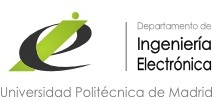Power and Control (POTC 2)
The aim of the course is that students gain knowledge about power electronics and process control. Regarding power electronics would be treated aspects of power electronic devices, linear regulators and switching regulators. In relation to process control, teaching objectives include mathematical aspects, analysis in time and frequency, and design of compensators and controllers
Topic 1: power electronic components (4 hours)
• Power diodes
• Power Bipolar Transistor
• Power MOSFET Transistor
• Comparison of power transistors.
• Drivers
• Exercises
Topic 2: Voltage Linear Regulators (7 hours)
• Structure of a linear power supply.
• Drive parameters.
• Linear Regulators.
• Protection circuits.
• Integrated Regulators.
• practical circuits.
• Exercises
Thread 3: switched regulators (8 hours).
• Principle of operation. Comparison with linear regulators.
• Basic topologies of converters.
• Reducing Converter. Analysis of continuous mode operation. Waveforms.
• Up converter. Analysis of continuous mode operation. Waveforms.
• Converter or inverter. Analysis of continuous mode operation. Waveforms.
• Voltage Mode PWM Control.
• Exercises.
Lab: Implementing a switching regulator (3 hours).
Topic 4: Introduction to automatic process control and dynamic systems modeling (5 hours)
• Closed-loop control vs. open loop control
• Linear Systems. Invariant linear systems. Laplace Transform.
• Block Diagrams.
• Simulation with Octave or Matlab
• Exercises
Lab: characterization of a mechanical system (DC motor) and speed control open loop power transistors and pulse width modulation (PWM) (2 hours)
Topic 5: Analysis of Control Systems (6 hours)
• Timing and frequency response. Analysis and simulation of first and second order
• Control actions: on / off, proportional, integral, derivative
• Steady state error (steady-state)
• Loads and disturbances Analysis
• Stability analysis: root locus. Nyquist criterion. Phase margin and gain margin. Simulations.
• Exercises
Topic 6: Design of compensators and controllers (4 hours)
• Phase lead compensators
• Phase-lag compensators
• Adjust PID controller (Ziegler-Nichols)
• Exercises
Lab: Implementing a control system: control system of a DC motor using PWM, testing various control algorithms (3 hours)
Teaching Methodology
For the development of the course will be taught participatory lectures (with simulations in Octave / Matlab), discussion sessions and practical problem solving.
In parallel, several practical works will be proposed.
The evaluation focuses on two main aspects:
1. A practical mainly written exam, where students have to solve exercises and practical cases, similar to those seen in class.
2. Two practical works. These works will be focused on the implementation of a switching regulator and a control system of a DC motor.
The final grade will be: 70% written examination and 30% practical work.

